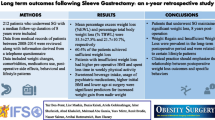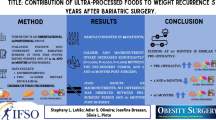Abstract
Purpose
Low-calorie (LCSs) may be negatively associated with weight and metabolic health. We hypothesized that LCS exposure may hinder the effectiveness of bariatric procedures. The aim of this study was to examine the association between preoperative LCS use and weight loss/comorbidity remission following sleeve gastrectomy and gastric bypass.
Material and Methods
We performed a retrospective chart review of 653 patients who underwent one of the two bariatric procedures and provided preoperative diet information. Patients who selected LCS as one of their most commonly consumed sweeteners and/or included “diet” drinks or sugar-free foods in their 24-h diet recall were categorized as “LCS users.” We used multiple logistic regression models to address the study objectives.
Results
Of 653 patients, 470 (72.0%) regularly consumed LCSs. LCS users were more likely to be older, have lower preoperative BMI, diabetic, using insulin, and have hyperlipidemia than non-LCS users. LCS consumption was not associated with the odds of achieving BMI < 35 kg/m2 nor the odds of achieving TBWL ≥ 20% in the adjusted models. While 39.6% of diabetic LCS users did not show remission, only 22.7% of diabetic non-LCS users did so at their last follow-up (p = 0.04). However, this association was attenuated when adjusted for insulin dependency.
Conclusions
There is no clear harm or benefit of preoperative consumption of LCS on weight loss or comorbidity remission after bariatric procedures. Further study is needed to more accurately assess the effect of LCSs on bariatric surgery outcomes.


Similar content being viewed by others
References
Sylvetsky AC, Welsh JA, Brown RJ, et al. Low-calorie sweetener consumption is increasing in the United States. Am J Clin Nutr. 2012;96(3):640–6.
Sylvetsky AC. Metabolic effects of low-calorie sweeteners: a brief review. Obesity (Silver Spring). 2018;26(Suppl 3):S25–31.
Sylvetsky AC, Dietz WH. Nutrient-content claims--guidance or cause for confusion? N Engl J Med. 2014;371(3):195–8.
Sylvetsky AC, Jin Y, Clark EJ, et al. Consumption of low-calorie sweeteners among children and adults in the United States. J Acad Nutr Diet. 2017;117(3):441–8. e2
Gardner C, Wylie-Rosett J, Gidding SS, et al. Nonnutritive sweeteners: current use and health perspectives: a scientific statement from the American Heart Association and the American Diabetes Association. Diabetes Care. 2012;35(8):1798–808.
Miller PE, Perez V. Low-calorie sweeteners and body weight and composition: a meta-analysis of randomized controlled trials and prospective cohort studies. Am J Clin Nutr. 2014;100(3):765–77.
Peters JC, Wyatt HR, Foster GD, et al. The effects of water and non-nutritive sweetened beverages on weight loss during a 12-week weight loss treatment program. Obesity (Silver Spring). 2014;22(6):1415–21.
Fowler SP, Williams K, Resendez RG, et al. Fueling the obesity epidemic? Artificially sweetened beverage use and long-term weight gain. Obesity (Silver Spring). 2008;16(8):1894–900.
Fowler SP, Williams K, Hazuda HP. Diet soda intake is associated with long-term increases in waist circumference in a biethnic cohort of older adults: the San Antonio Longitudinal Study of Aging. J Am Geriatr Soc. 2015;63(4):708–15.
Dhingra R, Sullivan L, Jacques PF, et al. Soft drink consumption and risk of developing cardiometabolic risk factors and the metabolic syndrome in middle-aged adults in the community. Circulation. 2007;116(5):480–8.
Imamura F, O’Connor L, Ye Z, et al. Consumption of sugar sweetened beverages, artificially sweetened beverages, and fruit juice and incidence of type 2 diabetes: systematic review, meta-analysis, and estimation of population attributable fraction. BMJ. 2015;351:h3576.
O’Connor L, Imamura F, Lentjes MA, et al. Prospective associations and population impact of sweet beverage intake and type 2 diabetes, and effects of substitutions with alternative beverages. Diabetologia. 2015;58(7):1474–83.
Rother KI, Conway EM, Sylvetsky AC. How non-nutritive sweeteners influence hormones and health. Trends Endocrinol Metab. 2018;29(7):455–67.
Stanhope KL, Goran MI, Bosy-Westphal A, et al. Pathways and mechanisms linking dietary components to cardiometabolic disease: thinking beyond calories. Obes Rev. 2018;19(9):1205–35.
Brethauer SA, Kim J, el Chaar M, et al. Standardized outcomes reporting in metabolic and bariatric surgery. Surg Obes Relat Dis. 2015;11(3):489–506.
Schauer PR, Bhatt DL, Kashyap SR. Bariatric surgery or intensive medical therapy for diabetes after 5 years. N Engl J Med. 2017;376(20):1997.
Mingrone G, Panunzi S, De Gaetano A, et al. Bariatric-metabolic surgery versus conventional medical treatment in obese patients with type 2 diabetes: 5 year follow-up of an open-label, single-centre, randomised controlled trial. Lancet. 2015;386(9997):964–73.
Cummings DE, Arterburn DE, Westbrook EO, et al. Gastric bypass surgery vs intensive lifestyle and medical intervention for type 2 diabetes: the CROSSROADS randomised controlled trial. Diabetologia. 2016;59(5):945–53.
Courcoulas AP, Belle SH, Neiberg RH, et al. Three-year outcomes of bariatric surgery vs lifestyle intervention for type 2 diabetes mellitus treatment: a randomized clinical trial. JAMA Surg. 2015;150(10):931–40.
Perez-Pevida B, Escalada J, Miras AD, et al. Mechanisms underlying type 2 diabetes remission after metabolic surgery. Front Endocrinol (Lausanne). 2019;10:641.
Nannipieri M, Mari A, Anselmino M, et al. The role of beta-cell function and insulin sensitivity in the remission of type 2 diabetes after gastric bypass surgery. J Clin Endocrinol Metab. 2011;96(9):E1372–9.
Camastra S, Gastaldelli A, Mari A, et al. Early and longer term effects of gastric bypass surgery on tissue-specific insulin sensitivity and beta cell function in morbidly obese patients with and without type 2 diabetes. Diabetologia. 2011;54(8):2093–102.
Hofso D, Fatima F, Borgeraas H, et al. Gastric bypass versus sleeve gastrectomy in patients with type 2 diabetes (Oseberg): a single-Centre, triple-blind, randomised controlled trial. Lancet Diabetes Endocrinol. 2019;7:912–24.
Dang JT, Sheppard C, Kim D, et al. Predictive factors for diabetes remission after bariatric surgery. Can J Surg. 2019;62(5):315–9.
Ma J, Fox CS, Jacques PF, et al. Sugar-sweetened beverage, diet soda, and fatty liver disease in the Framingham Heart Study cohorts. J Hepatol. 2015;63(2):462–9.
Tabesh MR, Maleklou F, Ejtehadi F, et al. Nutrition, physical activity, and prescription of supplements in pre- and post-bariatric surgery patients: a practical guideline. Obes Surg. 2019;29(10):3385–400.
Nielsen MS, Schmidt JB, le Roux CW, et al. Effects of Roux-en-Y gastric bypass and sleeve gastrectomy on food preferences and potential mechanisms involved. Curr Obes Rep. 2019;8(3):292–300.
Sylvetsky AC, Rother KI. Nonnutritive sweeteners in weight management and chronic disease: a review. Obesity (Silver Spring). 2018;26(4):635–40.
Sundborn G, Thornley S, Merriman TR, et al. Are liquid sugars different from solid sugar in their ability to cause metabolic syndrome? Obesity (Silver Spring). 2019;27(6):879–87.
Author information
Authors and Affiliations
Corresponding author
Ethics declarations
Conflict of Interest
Drs. Moon, Teixeira, and Jawad, and Ms. Brazzi-Smith have no commercial associations that might be a conflict of interest in relation to this article.
Ethical Approval
For this type of study, formal consent is not required.
Informed Consent
Does not apply.
Additional information
Publisher’s Note
Springer Nature remains neutral with regard to jurisdictional claims in published maps and institutional affiliations.
Electronic supplementary material
ESM 1
(DOCX 25 kb)
Rights and permissions
About this article
Cite this article
Moon, R.C., Brazzi-Smith, G., Teixeira, A. et al. Preoperative Exposure to Low-Calorie Sweeteners and Bariatric Surgery Outcomes. OBES SURG 30, 5012–5019 (2020). https://doi.org/10.1007/s11695-020-04931-4
Received:
Revised:
Accepted:
Published:
Issue Date:
DOI: https://doi.org/10.1007/s11695-020-04931-4




